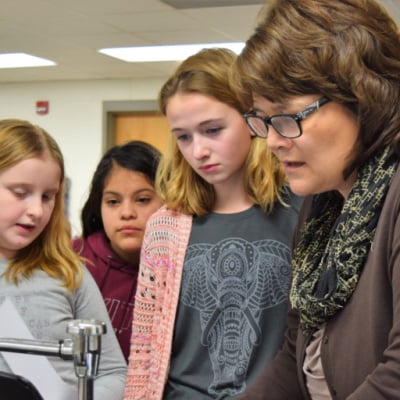Personalized Professional Learning
![]()
Forward-thinking, personalized professional learning is thoughtfully and intentionally designed to inspire leadership competencies, encourage effective instructional practice, and support fluency with strategies for learner success. Technology both enhances and improves professional learning experiences when it is used to expand access to high-quality, enduring, job-embedded opportunities for professional growth among educators. Such opportunities lead to improved academic success and increase literacy and fluency, deepening knowledge and application of skills universally necessary in a digital world. Future ready leaders remove the barriers of geography and time for professional learning and provide educators with increased opportunities to (1) engage both in person and/or digitally in professional learning communities, (2) participate in peer-to-peer lesson design and sharing, (3) benefit from peer-to-peer coaching, and (4) better analyze, purpose, and leverage data and assessment for individual learning outcomes. Technology resources offer educators vast opportunities to collaborate, learn, innovate, share, design, and cultivate effective practices with colleagues across the country. Future ready leaders establish and sustain this type of collaborative culture by highlighting the need for iteration and personalized supports to meet the needs of all educators and learners. With a systemic focus, future ready leaders ensure all professional learning instances exemplify learner-centered instruction with paralleled emphasis on reflection and growth as end goals of learning. In this way, future ready personalized professional learning successfully supports authentic implementation and impact on learning outcomes.
Shared Ownership and Responsibility for Professional Growth
Future ready educators actively reinforce their own professional practices by using a variety of emerging technologies and resources, such as online learning, and social media to optimize teaching and learning. Proactive and self-directed, future ready educators take responsibility for their own professional growth through local and online professional learning networks (PLNs), communities of practice, and social media (e.g., Twitter feeds, EdCamps, blogging and following bloggers, on-demand videos, etc.). Educators access collaborative tools and digital environments that break down classroom, school, and district walls. Professional learning encourages, facilitates, and often requires educators whether individually or collaboratively to seek out professional networks both within and outside their district. The district commits to expanding its policies and practices to provide teachers, administrators, and other education professionals experience and equitable growth opportunities that encourage, incentivize, and value personalization of professional learning.
Personalizing Professional Learning Pathways
Future ready leaders develop a comprehensive K–12 professional learning vision and design implementation plans with a menu of offerings that support personalized pathways of learning. Efforts to provide voice, choice, and/or delivery style for required content are made to support fidelity, honor the commitment to personalization, and more fully engage involved learners (e.g., campus, department, grade level). Future ready professional learning fosters capacity and empowers agency as educators identify and explore content specific to their needs, interests, and skills. It is designed to feature multiple learning environments, strategies, resources, and routines identified as research informed (quantitative and qualitative), inclusive, and culturally representative.
Future Ready Skill Set
Future ready educators have on-going and varied opportunities to expand their knowledge and skills to incorporate a focus on critical thinking, collaboration, creativity, communication, technology competencies, self-direction, information, and media literacies. To ensure support for all learners, opportunities for culturally responsive instruction, anti-racism, and unconscious bias training occur regularly. Inspired by and rooted in learning science research, the delivery of future ready professional learning is interactive and demonstrative. Sessions and workshops feature experiential instructional practices, purposefully designed to promote future ready skills and deeper learning. Future ready educators master a variety of research-based instructional strategies to better engage and connect with students to prepare them for college and beyond; in doing so, they develop familiarity, fluency, and competency in their own future ready skill set.
Diverse Opportunities for Professional Learning Through Technology
Future ready leaders model innovative approaches to personalized professional learning and ensure that educators have access to a strong foundation of digital skills necessary to leverage personalized opportunities that are diverse, customizable, and often supported by emerging technologies. Policies and practices consistently and coherently identify a variety of professional learning resources and opportunities that reinforce commitments to personalization, agency, and equity. Future ready districts accept and encourage nontraditional modalities of professional learning as qualified requirements for licensure renewal, such as social media engagement, blogging, and networking with PLNs. Needs assessments and points of reflection are gathered and utilized continuously by leaders at the school and district level to maintain a professional learning catalog of offerings that are current and personalized by need.
Broad-Based Participative Reflection
Collaborating with and seeking mentors with expertise in applicable experiences, future ready educators build, maintain, and grow active PLNs within their schools, districts, and online communities. To nurture participation and self-regulated professional behaviors, educators thoughtfully reflect and assess their current understanding to set appropriate goals accordingly. Future ready educators use these self-selected goals to drive instructional decisions and maintain portfolios of practice, curating exemplars of prototypes, iterating as needed, and reflecting measurements of progress and growth. Continual reflection and intentional iteration are supported and encouraged throughout the educator evaluation process, drawing from a broad set of indicators that includes student achievement, evidence of improved instructional practice, student engagement, and overall learning experience.
Featured Resource
[CASE STUDY] Improving Instruction Through Professional Learning
Sioux City Community School District made significant investments in digital transformation, implementing a one-to-one student to device initiative at the high school level; expanded multiple science, technology, engineering, math (STEM), and career-focused program offerings.
Implementation Guide
Access to Varied and Customizable Content, Curriculum and Assessments
Provide teachers with access to resources for curriculum, assessments, and professional learning to support strong content knowledge and pedagogy.
